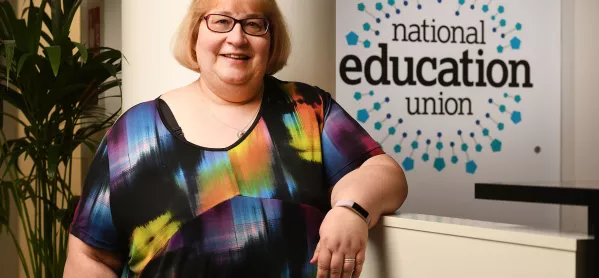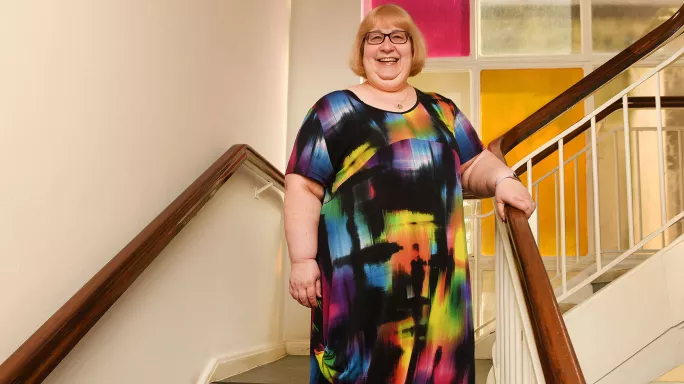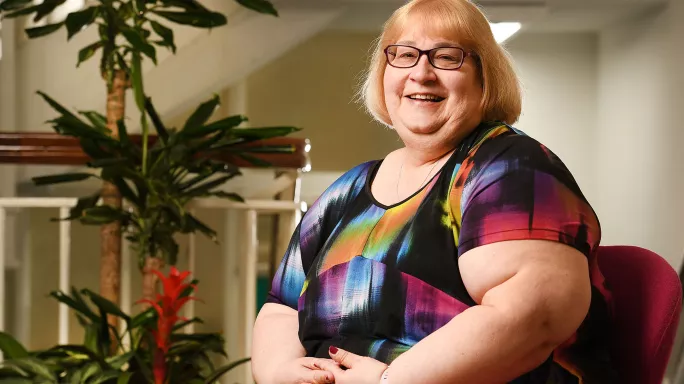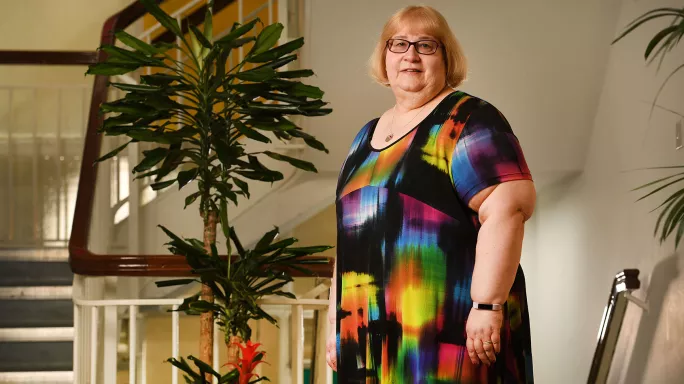- Home
- ‘Teachers are using foodbanks - education needs more money’
‘Teachers are using foodbanks - education needs more money’

Teachers are not only feeding and clothing pupils in the current climate of austerity, but they are also helping teaching assistants as well.
So says Kim Knappett, joint-president of the NEU teaching union, who tells of a teacher she met recently who had built up “a cupboard full” of school uniforms and PE kits and cereal bars and other items for pupils in need.
“It broke her heart when a TA came up and asked if she had any boys’ shoes for her son,” says Knappett.
Pay rise: Unions demand 5 per cent pay rise for teachers and heads
Quick Read: One in five teachers denied national pay rise
Exclusive: DfE ‘on Pluto’ for expecting schools to fund next teacher pay rise
The mother-of-two, who has herself fed pupils as well as washed and stitched their clothes over 30 years as a science teacher in London, will be a key figure at the NEU annual conference which begins in Liverpool on Monday.
Cuts to schools funding is her “burning issue” and she’s “really excited” that it’s the first motion to be debated at conference.
She says teachers are barely earning above the national minimum wage when you calculate the hours they’ve worked divided by their salary.
‘You won’t get a world-class education on the cheap’
And there are some, she says, who are using a foodbank which she helps run for a group of local churches near her home in Lewisham.
She tells of a young teacher renting a box room in London who was chuffed to find a second-hand table that fitted over his bed so that he could sit and do his marking.
Knappett gives more examples of austerity, including a school that tried to get away with not paying support staff for the five minutes each afternoon (or 25 minutes a week) when children were moving between lessons, even though they were walking the building with them and keeping an eye on them (including pupils with SEND).

“Everything comes from funding,” she says. “Our workload will never get any better until there’s more funding because, of course, everybody is being asked to do the work of more than one person. And I don’t think teachers or TAs pay or anybody else’s pay is going to improve until education is properly funded.
“You won’t get a world-class education on the cheap!”
But is there money available?
Government ‘took its eye off education’ in favour of Brexit
Knappett points out that money has been found for debating and preparing for Brexit, during which time, she says, the government has “taken its eye off an awful lot of things,” including education.
“If you’re moving house, you might be focused on that, but you still have to eat and do your washing and pay your bills and be able to balance everything. And I don’t think that balance has happened [with Brexit] ”.
Knappett loves analogies, and you get the idea she has a talent for putting difficult concepts into simple terms for pupils in her science lessons.
Her main subject is chemistry, which she says attracted her because she liked the “measurements” and “the accuracy of doing something like a titration”.
She says another thing that attracted her to chemistry was “the colours.” In particular, she likes the colours of the transition metals during flame tests. Sodium is a “the old street light colour” of yellow-orange, she says, while potassium is lilac and caesium is red.
Her dress for the Tes photo shoot is also notably colourful, and helps her “stand out from the grey suits”.
Right chemistry for unions to amalgamate
So was it like a chemical experiment when the NUT and ATL unions merged to form the NEU back in 2017? It’s an analogy which Knappett buys into straight away.
“Yes and it’s gone right - because we spent of lot of time doing the research,” she says.
The research began with a year of talks, back in 2014, at which it was decided the two organisations had more in common than divided them. What followed was a joint officer group of senior lay member from both unions who worked together for more than 18 months before a special conference was held. New rules and structures had to be considered, and there was strong investment in pre-planning on both sides.
Knappett admits there are still problems in bringing together almost half-a-million people on the ground, including that some members don’t understand they’re in a new union. But she says industrial disputes (over proposed job cuts and changes to contracts) have now been resolved.
And then there’s another analogy; she likens the amalgamation to spending Christmas with a new partner.

“It was quite stark for me the first Christmas with my husband because he comes from a Bretheren background so they don’t celebrate Christmas, whereas I come from a background that does. My sister has 90 pairs of Christmas earrings!
“You think that that the way you celebrate Christmas is the way it should be celebrated - what time you open your presents, whether you have dinner at lunch or dinnertime, whether you have a special breakfast - all of those things.
“And when you get together with a new partner you suddenly discover that your way isn’t the only way and that, actually, it doesn’t matter whether you have lunch at lunchtime or dinnertime or when you open your presents. Because it’s about being together and about the atmosphere of celebrating something together, and that’s what it’s been like bringing together two unions.
“And we are still going to be working through that process and sometimes people do things just because they assume it’s right, and there’s no malice in it, it’s just that’s the way they’ve always done it.”
Was there a fear among former ATL members, like her, about amalgamating with a union that had a tradition for being more militant?
“I think there was a misconception,” she says. “I think we are all militant to a certain extent - it’s just that the way people have expressed that has been different in some places.
She recalls a joint campaign surrounding a school in south-east London where her NUT colleague took the group that wanted to picket outside at a school governors’ meeting and then march to the town centre and “make a lot of noise,” whereas she sat in the local cafe with people writing to the MP.
“But we both had people from both unions in our groups, and that said a lot to me!
“The NEU is now a massively broad church and the thing that unites us is that we have a passion for education, for children and young people and for the fact that we should all be lifelong learners.
Knappett, aged 54, says she herself hasn’t stopped learning, including about trade union amalgamations.
Lesson in trade-unionism ‘from my dad’
But the first lesson in trade-unionism was more than 30 years ago, from her dad, a self-employed builder who wasn’t even in a union.
“He said get on the right side of your cleaner, your science technician and your school keeper. He said you’re going into a unionised profession - and these are the people who can make the absolute difference to how you deliver in the classroom.”
Of course, he was right - because her first technician “was worth her weight in gold”.
“On my first day, she showed me this cheat box in the bottom drawer. It was full of things like test tubes of different gases in case I did an experiment that didn’t work. So if it was an experiment that was supposed to produce, say, carbon dioxide and it didn’t do very well, I still had some carbon dioxide.”

Knappett is a big believer in the idea of community, whether in the school or in the wider neighbourhood of a school. Yet she laments the breakdown of communities, partly caused by funding cuts and the subsequent closure of Sure Start centres, for example, and youth clubs.
It’s a possible cause of knife crime, she says, which has affected her pupils over the years, including one who was stabbed outside the school gates in the 1990s, and in a separate incident, one of her pupils was stabbed to death after he went assist someone who was in a fight.
“I’ve seen communities start to break down. I think there is a lack of real aspiration among young people, or they don’t see that they’re gonna get where they want to get.”
‘Narrowing the curriculum will come back and bite us’
Knappett often talks to her son, 20, about the issue and why people carry knives. He has Asperger’s but has now left home and lives independently in Wales, where he is an apprentice engineer on a railway line.
She is happy and reassured with the fact that he can cook, and this is a result of him taking a GCSE in food technology, she says.
At the same time, she worries about her daughter, 16, who didn’t take food technology “because of the pressures on the curriculum”.
“Narrowing of curriculum will come back and bite us later on,” she says.
“I’d like to see a broader curriculum - and an end to GCSEs.
“We currently have an education system where young people need to stay in education or some form of training until 18 - so why are we assessing them before the end?
“I think we need to have the balance to make sure that our curriculum is what our children and young people need to engage them to continue learning, and I don’t like this whole idea of labelling anybody a failure at any time.”
The NEU annual conference takes place in Liverpool between 15 and 19 April.
CV - Kim Knappett
Education
1970-76 Stillness School Junior School, Lewisham
1976-83 Sydenham High School, Lewisham
1983-86, University College London, BSc Chemistry
1986-87 Kings College London PGCE
Work
1987-89 Northolt High School Ealing, teacher
1989-94 Sydenham School, Lewisham, teacher
1995-2000 Kidbrooke School, Greenwich, teacher
2000-present Forest Hill School, teacher
Union career
2002-18 ATL national executive member
2013-18 ATL national officer
2015-16 ATL national President
2019 NEU joint-national president
Keep reading for just £1 per month
You've reached your limit of free articles this month. Subscribe for £1 per month for three months and get:
- Unlimited access to all Tes magazine content
- Exclusive subscriber-only stories
- Award-winning email newsletters



